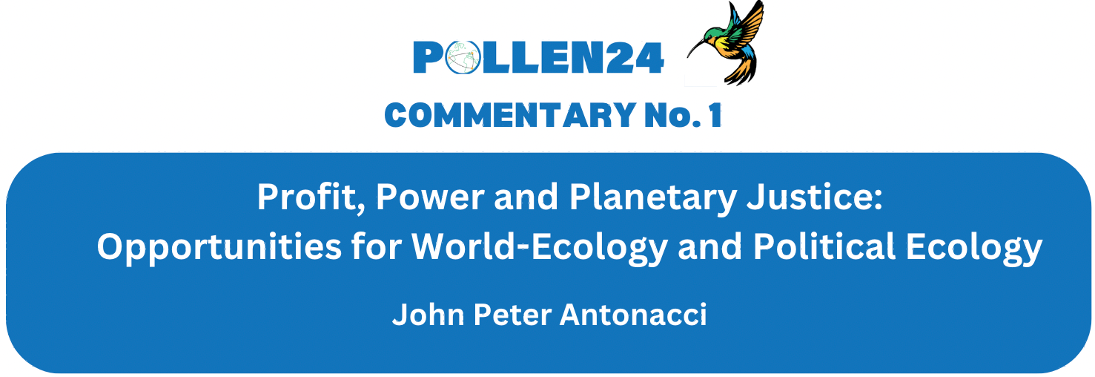2024-04-01
Profit, Power, and Planetary Justice: Opportunities for World-Ecology and Political Ecology

Abstract
The world-ecology and political ecology perspectives employ complementary conceptual apparatuses and share congruent political concerns. As such, they have much to learn from each other. This article will begin by reflecting on the crisis of the contemporary juncture, arguing that we must employ a body of concepts that can tackle interlinked problems of power, profit, and planetary justice. The article will then briefly introduce the world-ecology perspective, an ongoing set of conversations of relevance to political ecologists. Finally, the article will conclude by outlining opportunities for world-ecologists and political ecologists to engage in dialogue on sets of problems relevant to their shared project, with the aim of charting out opportunities for further collaboration.
Introduction—The Problem at the Contemporary Conjuncture
Three interconnected sets of crises define the contemporary conjuncture. First, crises of capitalism loom on the horizon. The ways in which capitalism may (or may not) continue to reproduce itself, and what a transition away from capitalism may entail are in question. Second, systems of power and domination in their racialized, gendered, and colonial bases persist and proliferate. Finally, global environmental crisis threatens to radically reshape life on earth. The scope, speed, and intensity of these developments demand analysis, and tools we deploy to understand these interconnections matter for how we approach solving these problems—they are instruments of planetary justice.
Here, I contend that the world-ecology and political ecology perspectives employ similar conceptual apparatuses and share congruent political concerns. Both perspectives engage in the critique of systems of power, recognizing that political domination has everything to do with environmental (in)justice and vice versa. And both perspectives find value in synthetic, cross-disciplinary work, that we must work both within and beyond the orthodoxy of political science and ecology. An ethic of synthesis is needed—where political ecology’s emphasis on the critique of political domination, and world-ecology’s insistence on situating environmental change within the concrete historical class struggle can meet in mutually constructive ways.
World-Ecology: A Brief Introduction
Developed by Jason W. Moore and the World-Ecology Research Network, the world-ecology perspective represents a collaborative, cross-disciplinary conversation among scholars, activists, and artists. It argues that capitalism does not have an “environmental regime,” but that capitalism is itself an environmental regime, a way of organizing environments towards endless accumulation (Moore, 2015; Patel & Moore 2017.)
At the core of the world-ecology perspective sits a re-reading of the law of value under capitalism—one that depends on interpreting the history of capitalism, the environmental history of modernity, and the history of political power as one history. Capital, historically, has faced two kinds of crises: crises of underproduction (too little labor, too few raw materials reaching the factory gates) and crises of overproduction (too many commodities produced with too few places to profitably reinvest) (Moore, 2011.) Key for world-ecologists is the idea that capital’s use of systems of power and domination to restructure environments has made it possible for capital to transcend these moments of crisis. Exploitation at the point of production represents one key relation that unlocks profitability for capital—extend the working day (and increase the absolute rate of exploitation) and/or reduce the socially necessary labor time to produce commodities (and increase the relative rate of exploitation)—and profitability returns.
But the world-ecologists rendering of the picture looks different. We argue that every act of exploitation at the point of production requires an even greater act of appropriation beyond the point of production—that is, every place where capitalists have not yet fully commodified the pulse of life making, but their power still extends.
Historically, capitalism has depended on its ability to secure “cheap natures.” These natures are not intrinsically cheap—they need to be produced as such through the use of systems of power and domination. The “four cheaps,” food, labor-power, energy, and raw materials, have been key to the maintenance of capital’s profitability, they are crucial mediators of the rate of profit. When costs of food, labor-power, energy, or raw materials become too high, capitalism extends the “commodity frontier,” extending its power to new locales, deploying the twin forces of ideology and state power to de-value the work of the web of life (See, respectively, Moore, 2000; Antonacci, 2023; Parenti, 2016; Moore, 2019.) These devaluations extend to the biosphere itself—forests razed (Wing, 2015), mines stripped (Bentancor, 2016), soil poisoned (Shattuck, 2021) all in the service of capital’s profitability. This, for capital, represents capital’s preferred mode of profit-maximization: use the power of state (Parenti, 2016), empire (Moore, 2023), and the gun (Antonacci, 2021) to transform environments to keep the costs of inputs to the production process low and profits high (Moore 2015.)
Power, Profit, and Environment: Oppertunities for Collaboration
If political power, profitability, and environmental crisis are linked, then the work that must continue to emerge needs to keep articulating these links in concrete, specific, and historical terms.
World-ecologists can continue to draw insight from political ecology’s analytical focus on articulations of political power as a process of environment-making. Narratives that link expressions of political domination to processes of environmental change help world-ecologists articulate the forms and functions that the power of states, empires, and corporations deploy in continually clearer and more concrete term. Political domination is a core feature of the modern experience, and political ecologist’s work in articulating these problematics in terms of environmental change is especially helpful to world-ecologists, who seek to understand and narrate the longue durée history of capitalism, from its inception to the present moment, as an environmental history of political power.
Likewise, world-ecology offers political ecologists a conceptual apparatus—a critique of ideology—with which they can closely link questions and problematics of political domination to mechanisms of the class struggle. The world-ecology perspective takes seriously Marx and Engels’ interlinked arguments on materialism and ideology developed in The German Ideology, wherein, at the same time, our concepts must treat human modifications of the rest of nature as the basis for history, and that the ideas of the ruling class are in every epoch the ruling ideas. (Marx & Engels, [1932] 1998, p. 37-67.) That the political power of ideology is a real, operative force in the world is of relevance to political ecologists. Ideological constructs of race, gender, and nature are real abstractions, taken as real by states and empires and deployed to transform environments, dominate humans, and cheapen and devalue webs of life. The world-ecology critique of ideology offers political ecologists a way to deal with real abstractions by unifying the constructivist strain in political ecology with materialist strains in environmental history, situating these ideological formulations as artifacts of class power.
References
Antonacci, John Peter. 2021. “Periodizing the Capitalocene as Polemocene: Militarized Ecologies of Accumulation in the Long Sixteenth Century.” Journal of World-Systems Research. 27(2): 439-467. https://doi.org/10.5195/jwsr.2021.1045.
Antonacci, John Peter. 2023. “Green Großraum: Carl Schmitt’s Political Ecology of Space.” Nordia Geographical Publications. 53(1): 63-81. https://doi.org/10.30671/nordia.121455.
Bentancor, Orlando. 2016. The Matter of Empire: Metaphysics and Mining in Colonial Peru. Pittsburgh, PA. University of Pittsburgh Press.
Marx, Karl & Friedrich Engels. [1932] 1998. The German Ideology. Amherst, NY. Promethean Books.
Moore, Jason W. 2000. “Sugar and the Expansion of the Early Modern World-Economy: Commodity Frontiers, Ecological Transformation, and Industrialization.” Review (Fernand Braudel Center.) 23(2): 409-433. http://www.jstor.org/stable/40241510.
Moore, Jason W. 2011. “The Socio-Ecological Crises of Capitalism” in Capitalism and its Discontents: Conversations with Radical Thinkers in a Time of Tumult. S. Lilley, ed. Oakland, CA. PM Press.
Moore, Jason W. 2015. Capitalism in the Web of Life: Ecology and the Accumulation of Capital. London, UK. Verso.
Moore, Jason W. 2019. “Who is Responsible for the Climate Crisis?” Maize. https://www.maize.io/cultural-factory/what-is-capitalocene/.
Moore, Jason W. 2023. “Imperialism, With and Without Cheap Natures: Climate Crises and the Demise of Westphalia’ in Das Argument. 340.
Parenti, Christian. 2016. “Environment-Making in the Capitalocene: Political Ecology of the State” in Anthropocene or Capitalocene?: Nature, History, and the Crisis of Capitalism. J. W. Moore, ed. Oakland, CA. PM Press.
Patel, Raj & Jason W. Moore. 2017. A History of the World in Seven Cheap Things: A Guide to Capitalism, Nature, and the Future of the Planet. Berkeley, CA. University of California Press.
Shattuck, Annie. 2021. “Toxic Uncertainties and Epistemic Emergence: Pesticide Use and Imperceptibility in Lao PDR.” Annals of the American Association of Geographers. 111(1): 216-230. https://doi.org/10.1080/24694452.2020.1761285.
Wing, John T. 2015. The Roots of Empire: Forests and State Power in Early Modern Spain, C. 1500-1700. Leiden, NL. Brill.
